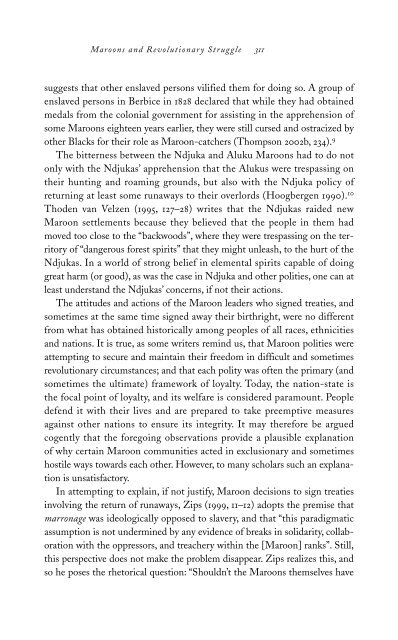60199616-flight-to-freedom-african-runaways-and-maroons-in-the-americas
60199616-flight-to-freedom-african-runaways-and-maroons-in-the-americas
60199616-flight-to-freedom-african-runaways-and-maroons-in-the-americas
You also want an ePaper? Increase the reach of your titles
YUMPU automatically turns print PDFs into web optimized ePapers that Google loves.
Maroons <strong>and</strong> Revolutionary Struggle<br />
311<br />
suggests that o<strong>the</strong>r enslaved persons vilified <strong>the</strong>m for do<strong>in</strong>g so. A group of<br />
enslaved persons <strong>in</strong> Berbice <strong>in</strong> 1828 declared that while <strong>the</strong>y had obta<strong>in</strong>ed<br />
medals from <strong>the</strong> colonial government for assist<strong>in</strong>g <strong>in</strong> <strong>the</strong> apprehension of<br />
some Maroons eighteen years earlier, <strong>the</strong>y were still cursed <strong>and</strong> ostracized by<br />
o<strong>the</strong>r Blacks for <strong>the</strong>ir role as Maroon-catchers (Thompson 2002b, 234). 9<br />
The bitterness between <strong>the</strong> Ndjuka <strong>and</strong> Aluku Maroons had <strong>to</strong> do not<br />
only with <strong>the</strong> Ndjukas’ apprehension that <strong>the</strong> Alukus were trespass<strong>in</strong>g on<br />
<strong>the</strong>ir hunt<strong>in</strong>g <strong>and</strong> roam<strong>in</strong>g grounds, but also with <strong>the</strong> Ndjuka policy of<br />
return<strong>in</strong>g at least some <strong>runaways</strong> <strong>to</strong> <strong>the</strong>ir overlords (Hoogbergen 1990). 10<br />
Thoden van Velzen (1995, 127–28) writes that <strong>the</strong> Ndjukas raided new<br />
Maroon settlements because <strong>the</strong>y believed that <strong>the</strong> people <strong>in</strong> <strong>the</strong>m had<br />
moved <strong>to</strong>o close <strong>to</strong> <strong>the</strong> “backwoods”, where <strong>the</strong>y were trespass<strong>in</strong>g on <strong>the</strong> terri<strong>to</strong>ry<br />
of “dangerous forest spirits” that <strong>the</strong>y might unleash, <strong>to</strong> <strong>the</strong> hurt of <strong>the</strong><br />
Ndjukas. In a world of strong belief <strong>in</strong> elemental spirits capable of do<strong>in</strong>g<br />
great harm (or good), as was <strong>the</strong> case <strong>in</strong> Ndjuka <strong>and</strong> o<strong>the</strong>r polities, one can at<br />
least underst<strong>and</strong> <strong>the</strong> Ndjukas’ concerns, if not <strong>the</strong>ir actions.<br />
The attitudes <strong>and</strong> actions of <strong>the</strong> Maroon leaders who signed treaties, <strong>and</strong><br />
sometimes at <strong>the</strong> same time signed away <strong>the</strong>ir birthright, were no different<br />
from what has obta<strong>in</strong>ed his<strong>to</strong>rically among peoples of all races, ethnicities<br />
<strong>and</strong> nations. It is true, as some writers rem<strong>in</strong>d us, that Maroon polities were<br />
attempt<strong>in</strong>g <strong>to</strong> secure <strong>and</strong> ma<strong>in</strong>ta<strong>in</strong> <strong>the</strong>ir <strong>freedom</strong> <strong>in</strong> difficult <strong>and</strong> sometimes<br />
revolutionary circumstances; <strong>and</strong> that each polity was often <strong>the</strong> primary (<strong>and</strong><br />
sometimes <strong>the</strong> ultimate) framework of loyalty. Today, <strong>the</strong> nation-state is<br />
<strong>the</strong> focal po<strong>in</strong>t of loyalty, <strong>and</strong> its welfare is considered paramount. People<br />
defend it with <strong>the</strong>ir lives <strong>and</strong> are prepared <strong>to</strong> take preemptive measures<br />
aga<strong>in</strong>st o<strong>the</strong>r nations <strong>to</strong> ensure its <strong>in</strong>tegrity. It may <strong>the</strong>refore be argued<br />
cogently that <strong>the</strong> forego<strong>in</strong>g observations provide a plausible explanation<br />
of why certa<strong>in</strong> Maroon communities acted <strong>in</strong> exclusionary <strong>and</strong> sometimes<br />
hostile ways <strong>to</strong>wards each o<strong>the</strong>r. However, <strong>to</strong> many scholars such an explanation<br />
is unsatisfac<strong>to</strong>ry.<br />
In attempt<strong>in</strong>g <strong>to</strong> expla<strong>in</strong>, if not justify, Maroon decisions <strong>to</strong> sign treaties<br />
<strong>in</strong>volv<strong>in</strong>g <strong>the</strong> return of <strong>runaways</strong>, Zips (1999, 11–12) adopts <strong>the</strong> premise that<br />
marronage was ideologically opposed <strong>to</strong> slavery, <strong>and</strong> that “this paradigmatic<br />
assumption is not underm<strong>in</strong>ed by any evidence of breaks <strong>in</strong> solidarity, collaboration<br />
with <strong>the</strong> oppressors, <strong>and</strong> treachery with<strong>in</strong> <strong>the</strong> [Maroon] ranks”. Still,<br />
this perspective does not make <strong>the</strong> problem disappear. Zips realizes this, <strong>and</strong><br />
so he poses <strong>the</strong> rhe<strong>to</strong>rical question: “Shouldn’t <strong>the</strong> Maroons <strong>the</strong>mselves have


